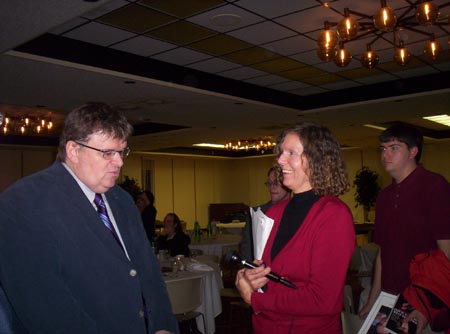« Rescue Dawn (2006) – Movie Review | Home | Resurrecting the Champ (2007) – Movie Review »
Manufacturing Dissent (2007) – Movie Review
By Robert L. Jones | August 7, 2007

Awkward Silence: Canadian journalist Debbie Melnyk is the only person on the planet able to silence "documentary" director Michael Moore. Her tactic? Just asking him for an interview.
The Ends Justify the Meanness
[xrr rating=4/5]
Manufacturing Dissent. Featuring Dave Barber, Noam Chomsky, Peter Damon, John Derevlany, Janeane Garofalo, David Gilmour, Ben Hamper, Christopher Hitchens, Harlan Jacobson, Jim Kenefick, Albert Maysles, Nick McKinney, Debbie Melnyk, Michael Moore, Errol Morris, James Musselman, Ralph Nader, Kevin Rafferty, Sam Riddle, Michael Wilson, and Byron York. Original music by Michael White. Cinematography by Rick Caine. Edited by Rob Ruzic and Bill Towgood. Written and directed by Rick Caine and Debbie Melnyk. (Liberation Entertainment/Mongrel Media/CHUM Limited, 2007, Color, 96 minutes. MPAA Rating: R.)
I confess: I thoroughly enjoyed Michael Moore’s “documentary” Sicko. I went to San Antonio’s Bijou Crossroads on its opening night, and from the looks of the crowd, every alienated leftist in town made it to the theater. They were there to commune with the work of this filmmaker, who looms (literally and figuratively) larger than life in American pop culture.
As Moore used cellulose acetate to compare and contrast the worm-eaten apples of American HMOs with the wholesome oranges of Canadian and British socialized medicine, I yucked it up with the rest of the crowd. It really was that entertaining, full of biting sarcasm and uproariously funny. Watching it, I became conscious of what it must have been like to have seen the “strike play” Waiting for Lefty during the nadir of the Great Depression. Moore’s agitprop films are crafted to be apprehended at an emotional level—bypassing critical thinking and sober reflection—to impel the audience to direct political action.
Unlike Moore’s conservative critics, though, I refused to get sucked into his hunger for publicity by reviewing Sicko. On one hand, panning Michael Moore’s facile infotainment is like shooting fish in a barrel. But, on the other, giving his sophistry the imprimatur of serious debate raises it to the unmerited plane of intellectual honesty.
As a result of Moore’s taking liberties with truth in his films, combined with his obstinate persona, some conservatives turned to the documentary medium to take on Moore on his own turf. Lionel Chetwynd’s Celsius 41.11 grapples with Fahrenheit 9/11’s many inaccuracies. Radio personality Larry Elder took on Moore’s shoddy treatment of gun control in Bowling for Columbine with Michael & Me. In his film, Elder took a page from Moore’s first feature, Roger & Me, attempting in vain to interview with the corpulent director.
Husband-and-wife documentary filmmakers Rick Caine and Debbie Melnyk began work on Manufacturing Dissent with a different purpose in mind. With their background in investigative journalism, they had already turned the camera lens on what they considered to be unsavory people in their trade. Their 1998 doc Junket Whore explored the incestuous relationship between the news media and the entertainment industry. Then they returned to their native Canada to cover press baron Conrad Black in their 2004 release Citizen Black.
“While we were following him around, we found out he was stealing millions of dollars from his shareholders,” Melnyk told me in a recent interview. “So, we decided for our next project to do one on someone we liked, Michael Moore,” whose confrontational interviewing style Melnyk has emulated in her work.
A self-described liberal, Melnyk has consistently voted for Canada’s New Democratic Party, which puts her considerably to the left of our northern neighbors’ Liberal Party. She and Caine oppose the U.S. war in Iraq as well as Canadian military involvement in Afghanistan. In Manufacturing Dissent, they use such documentary clichés as slow-motion and ominously foreboding synthesizer chords to depict George W. Bush’s two presidential election victories. Obviously, they wear their ideological hearts on their sleeves.
Yet, when they hit the road in search of Michael Moore, they unexpectedly and slowly begin to uncover the real man beneath the carefully cultivated mask of the blue-collar Everyguy.
Filmed during Moore’s 2004 “Slacker Uprising,” get-out-the-vote college campus tour, Melnyk calmly but firmly approaches Moore to ask him for an in-depth interview. He noncommittally promises an interview “after the election,” but shortly thereafter, Moore’s security detail doggedly shoo Melnyk and her crew away. After being turned back from venue after venue, Melnyk dryly narrates, “I thought Michael Moore liked Canadians.”
Much of their film centers on reminiscences from Moore’s friends and associates. Former “TV Nation” producer Nick McKinney remembers Moore as a volatile but generous boss, who made the touching gesture of buying his protégé airline tickets so he could attend his first film’s premiere. For Democrat Party consultant Sam Riddle, Moore’s still a longtime pal with a heart of gold. Yet even Riddle admits “he can be a bit megalomaniacal at times, with a paranoid tinge.” Rock music journalist Dave Marsh remembers Moore as a jerk whose alternative paper would regularly run Marsh’s popular syndicated features, but who’d always stiff him on payment for reprinting his column. Slowly, a portrait emerges of Moore as a user who’d make even Dorian Gray blush.
Worse, Caine and Melnyk uncover a plethora of instances in which Moore manipulated facts in order to present a warped version of the truth. While admirers like former Toronto film festival director Helga Stephenson brush aside such peccadilloes, saying that Moore’s approach has popularized what was previously an aficionado’s genre, others find his opportunism troubling.
“He’s been found to have fabricated, or invented—carpentered—a number of distortions and outright lies into his narrative,” notes writer Christopher Hitchens.
One example is how Moore used footage of Massachusetts Army National Guardsman Sgt. Peter Damon, who lost both arms in a helicopter accident in Iraq. Moore edited the footage in Fahrenheit 9/11 to make it appear the gung-ho troop was disenchanted with President Bush and the Iraq War effort. But Damon still supports both Bush and the war and (unsuccessfully) sued Michael Moore for taking his words out of context.
Pioneering documentarian Albert Maysles dismisses Moore’s achievements. For the eclectic director—whose subject matter ranges from door-to-door Bible salesmen, the rock group Rolling Stones, and virtuoso pianist Vladimir Horowitz—what’s at stake is the integrity of the documentary process as a means of imparting truth. In a recent interview, Maysles described the documentarian’s role as filmmaker:
Hitchcock put it beautifully when he said, “In a fiction film the director is God. In a non-fiction film—a documentary—God is the director”. . . . And if you happen to be an agnostic or an atheist, then call God “reality.” We are governed by reality rather than trying to control it. [Emphasis added].
In bonus footage in the Canadian screener DVD, Maysles expanded on this, saying, “What we need more than anything is knowledge of the real world that is unprejudiced, that doesn’t start out with the determination on the part of a filmmaker to prejudge and to be limited by a point-of-view.” Maysles doesn’t buy that Moore is a boon to the documentary trade, despite having raked in millions. “But he’s entertaining us with propaganda,” he countered a journalist supporting Moore. “So did Hitler.”
It is not at all surprising when we arrive at the most damning evidence of Moore’s personal and professional malfeasance, in a former friend’s testimony. Jim Musselman worked with Moore during the inception of Roger & Me. They envisioned it as a document of the efforts of workers, labor unions, and liberal groups in Flint, Michigan, to keep the General Motors plant open in the late 1980s. To the idealistic Musselman, seeing his friend transform that film into an unfulfilled personal quest to interview GM chairman Roger Smith—leaving hours of footage of community efforts and rallies on the cutting-room floor—left him disillusioned.
Moore telephoned Musselman late one night, asking him not to mention that Moore did, in fact, interview Smith—twice. “I can make it look like anything I want,” Musselman recalls Moore telling him. “It’ll just go on the cutting-room floor.”
“Michael Moore says everyone is subjective,” Melnyk told me. “You cannot say no one is objective. There are certain truths in the world, certain things you should not do like taking people out of context, and Moore does that. He puts two half-truths together and then tells you it’s the whole truth.”
By movie’s end, what’s left of Michael Moore’s credibility is shredded to ribbons. Melnyk and Caine started out on a quest to capture their hero on film, only to find an empty windbreaker strutting about, leaving a trail of broken friendships and a pack of lies in his wake.
But, Melnyk also found many principled people along the way, such as Albert Maysles and Ralph Nader. “In particular, Jim Musselman had such great integrity,” Melnyk said, referring to Musselman’s refusal to fall on his sword for Moore.
It is borne out in Musselman’s warning in the documentary, about the dangers of those who succumb to the cult of celebrity, at the expense of the evidence of their own experiences.
“I would get calls from people who were quote-unquote pretty high up on the left, and they’d say ‘you have to stand up and lie for him,’ and they’d say, ‘the ends justify the means,’” Musselman recalled. “It’s the saddest thing, who we put our faith in. We follow leaders too much. We don’t follow what’s in our own heart and soul enough.”
Robert L. Jones is a photojournalist living and working in Minnesota. His work has appeared in Black & White Magazine, Entrepreneur, Hoy! New York, the New York Post, RCA Victor (Japan), Scene in San Antonio, Spirit Magazine (Canada), Top Producer, and the Trenton Times. Mr. Jones is a past entertainment editor of The New Individualist.
Topics: Documentaries, Foreign Films, Independent Films, Movie Reviews | Comments Off on Manufacturing Dissent (2007) – Movie Review
